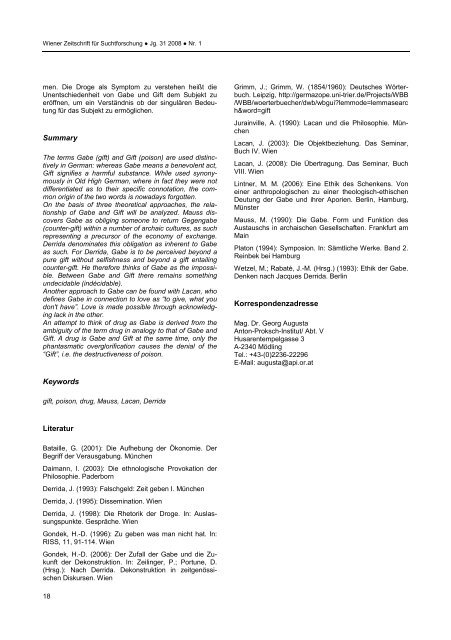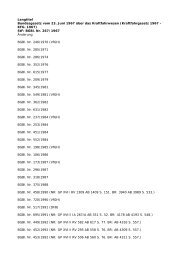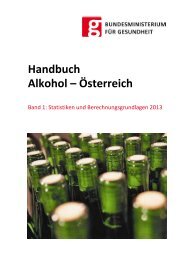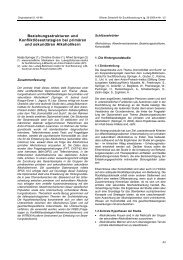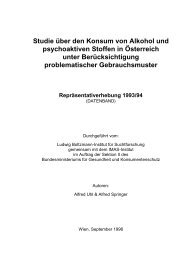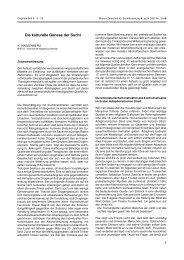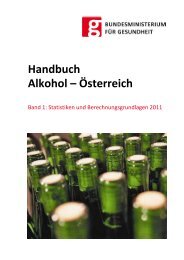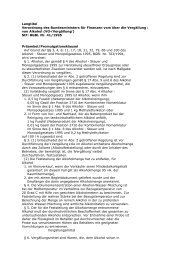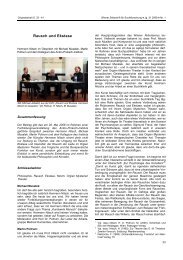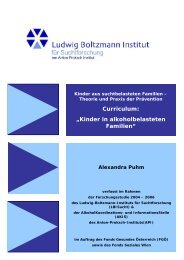Erfolgreiche ePaper selbst erstellen
Machen Sie aus Ihren PDF Publikationen ein blätterbares Flipbook mit unserer einzigartigen Google optimierten e-Paper Software.
Wiener Zeitschrift für Suchtforschung Jg. 31 2008 Nr. 1<br />
men. Die Droge als Symptom zu verstehen heißt die<br />
Unentschiedenheit von Gabe und Gift dem Subjekt zu<br />
eröffnen, um ein Verständnis ob der singulären Bedeutung<br />
für das Subjekt zu ermöglichen.<br />
Summary<br />
The terms Gabe (gift) and Gift (poison) are used distinctively<br />
in German: whereas Gabe means a benevolent act,<br />
Gift signifies a harmful substance. While used synonymously<br />
in Old High German, where in fact they were not<br />
differentiated as to their specific connotation, the common<br />
origin of the two words is nowadays forgotten.<br />
On the basis of three theoretical approaches, the relationship<br />
of Gabe and Gift will be analyzed. Mauss discovers<br />
Gabe as obliging someone to return Gegengabe<br />
(counter-gift) within a number of archaic cultures, as such<br />
representing a precursor of the economy of exchange.<br />
Derrida denominates this obligation as inherent to Gabe<br />
as such. For Derrida, Gabe is to be perceived beyond a<br />
pure gift without selfishness and beyond a gift entailing<br />
counter-gift. He therefore thinks of Gabe as the impossible.<br />
Between Gabe and Gift there remains something<br />
undecidable (indécidable).<br />
Another approach to Gabe can be found with Lacan, who<br />
defines Gabe in connection to love as “to give, what you<br />
don't have”. Love is made possible through acknowledging<br />
lack in the other.<br />
An attempt to think of drug as Gabe is derived from the<br />
ambiguity of the term drug in analogy to that of Gabe and<br />
Gift. A drug is Gabe and Gift at the same time, only the<br />
phantasmatic overglorification causes the denial of the<br />
“Gift”, i.e. the destructiveness of poison.<br />
Grimm, J.; Grimm, W. (1854/1960): Deutsches Wörterbuch.<br />
Leipzig, http://germazope.uni-trier.de/Projects/WBB<br />
/WBB/woerterbuecher/dwb/wbgui?lemmode=lemmasearc<br />
h&word=gift<br />
Jurainville, A. (1990): Lacan und die Philosophie. München<br />
Lacan, J. (2003): Die Objektbeziehung. Das Seminar,<br />
Buch IV. Wien<br />
Lacan, J. (2008): Die Übertragung. Das Seminar, Buch<br />
VIII. Wien<br />
Lintner, M. M. (2006): Eine Ethik des Schenkens. Von<br />
einer anthropologischen zu einer theologisch-ethischen<br />
Deutung der Gabe und ihrer Aporien. Berlin, Hamburg,<br />
Münster<br />
Mauss, M. (1990): Die Gabe. Form und Funktion des<br />
Austauschs in archaischen Gesellschaften. Frankfurt am<br />
Main<br />
Platon (1994): Symposion. In: Sämtliche Werke. Band 2.<br />
Reinbek bei Hamburg<br />
Wetzel, M.; Rabaté, J.-M. (Hrsg.) (1993): Ethik der Gabe.<br />
Denken nach Jacques Derrida. Berlin<br />
Korrespondenzadresse<br />
Mag. Dr. Georg Augusta<br />
Anton-Proksch-Institut/ Abt. V<br />
Husarentempelgasse 3<br />
A-2340 Mödling<br />
Tel.: +43-(0)2236-22296<br />
E-Mail: augusta@api.or.at<br />
Keywords<br />
gift, poison, drug, Mauss, Lacan, Derrida<br />
Literatur<br />
Bataille, G. (2001): Die Aufhebung der Ökonomie. Der<br />
Begriff der Verausgabung. München<br />
Daimann, I. (2003): Die ethnologische Provokation der<br />
Philosophie. Paderborn<br />
Derrida, J. (1993): Falschgeld: Zeit geben I. München<br />
Derrida, J. (1995): Dissemination. Wien<br />
Derrida, J. (1998): Die Rhetorik der Droge. In: Auslassungspunkte.<br />
Gespräche. Wien<br />
Gondek, H.-D. (1996): Zu geben was man nicht hat. In:<br />
RISS, 11, 91-114. Wien<br />
Gondek, H.-D. (2006): Der Zufall der Gabe und die Zukunft<br />
der Dekonstruktion. In: Zeilinger, P.; Portune, D.<br />
(Hrsg.): Nach Derrida. Dekonstruktion in zeitgenössischen<br />
Diskursen. Wien<br />
18


